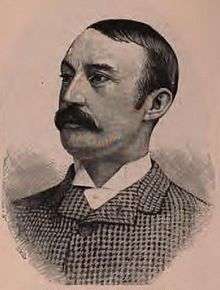John William Logan

John William Logan, known as "Paddy" Logan, (1845 – 25 May 1925),[1] was a civil engineering contractor and Liberal Member of Parliament (MP) for Harborough in Leicestershire.
He was the son of John Logan of Newport, Monmouthshire and educated at King's School, Gloucester. J. W. Logan was a successful railway contractor with the civil engineering firm of Logan and Hemingway. He moved to Leicestershire in 1876 to supervise a railway contract and lived near Market Harborough at East Langton Grange, where he gave the village a cricket ground and a hall. He also maintained a cottage home for the children of men killed on his works.[2]
His health was poor following a hunting accident and he resigned as MP on two occasions. Logan had won Harborough from the Tories at a by-election on 8 May 1891 and held it until his resignation on 1 June 1904.[3] He returned at the second general election of 1910, only to resign again six years later.[3] His political career was devoted to improving the lot of agricultural labourers, and it was in their interests that he had agreed to stand for parliament on the second occasion, but the strain proved too great, forcing him to retire permanently from public life.[4]
During his election campaigns, he was often denied the use of public halls and held his meetings under canvas in what he called the "free speech tent".[4]
He has the distinction to have been appointed as both Steward of the Manor of Northstead and Steward of the Chiltern Hundreds. He was appointed to the former post in 1904 and to the latter in 1916.[3] The Stewards of the Manor of Northstead and of the Chiltern Hundreds are notional 'offices of profit under the crown' which are used a procedural device to enable MPs to resign.
J. W. Logan was a prominent sportsman and one of the founding fathers of the British racing pigeon fancy,[5] writing Logan’s Pigeon Racer’s Handbook. He was president of Leicestershire County Cricket Club and his son, Hugh,[6] played a single first-class cricket match for Leicestershire.[7]
On his death at the age of 80 in 1925, he was buried at East Langton, where he had lived for 50 years.[4]
References
- ↑ Leigh Rayment's Historical List of MPs – Constituencies beginning with "H" (part 1)
- ↑ Church Langton | British History Online
- 1 2 3 Department of Information Services (14 January 2010). "Appointments to the Chiltern Hundreds and Manor of Northstead Stewardships since 1850" (PDF). House of Commons Library. Retrieved 13 August 2010.
- 1 2 3 The Late Mr. J. W. Logan, The Times, Friday 29 May 1925, p. 16
- ↑ http://www.zyworld.com/themarathonpigeon/mp-2.htm
- ↑ "British War Graves - Leicestershire". www.britishwargraves.co.uk. Retrieved 1 March 2012.
- ↑ "Player profile: Hugh Logan". CricketArchive. Retrieved 1 March 2012.
External links
- Hansard 1803–2005: contributions in Parliament by John Logan
| Parliament of the United Kingdom | ||
|---|---|---|
| Preceded by Thomas Tapling |
Member of Parliament for Harborough 1891–1904 |
Succeeded by Philip Stanhope |
| Preceded by Thomas Tertius Paget |
Member of Parliament for Harborough 1910–1916 |
Succeeded by Percy Alfred Harris |